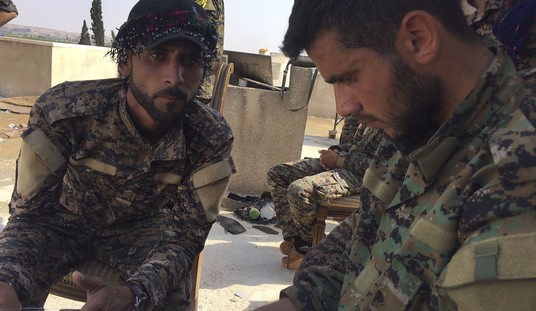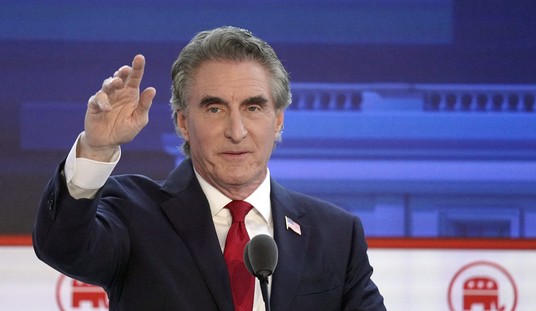If you want to see why American influence is rapidly eroding in the world you need only to look at the clowns who are mismanaging our foreign policy in action. Via Politico:
As Russia pounded Syria with air strikes for a second day Thursday, the Obama administration showed little appetite for directly challenging Moscow’s bold foray into the Middle Eastern conflict.
Instead, the White House is responding to Vladimir Putin with an almost taunting message: Good luck with that.
Senior Obama officials debating the U.S. response say they believe the Russian president is making a costly mistake that he will regret, committing his country’s military and prestige to an unwinnable fight sure to inflame Islamic extremism inside Russia.
Often we are lectured by the left on how Obama is so smart and is playing five dimensional chess while we are all struggling to play pick-up sticks but all evidence indicates that the Obama regime is working without any strategic concept whatsoever and is being out-maneuvered by virtually anyone they come up against.
The analysis presented above is simply wishful thinking. First, Putin has shown in Chechnya that he’s as willing to kill as many Islamists as it takes to keep their extremism under control. This is a lesson we could have put to great advantage in Iraq and Afghanistan. Second, the prestige on the line if there is a failure is Iran’s. Putin has set up a situation where if his allies prevail that he is a hero and if they fail, because Iran is rapidly becoming the main ground force in Syria after Assad’s army, he is undiminished. Assad and Iran will ultimately prevail because, like Putin (and like Obama in Fast & Furious), they are willing to kill however many it takes to make their point and they have to live in the neighborhood.
Russian goals are geo-strategic, Syria is only a tool
Right now the US government and many analysts are treating Russian involvement in Syria as an exercise of Russian power. In reality, the objective it destroying American influence and thereby increasing the ability of Russia to operate as it pleases anywhere in the world.
To view Syria correctly you have to see that Syria; Crimea; Ukraine; the Baltic States; bomber flights in highly visible areas like Alaska, Guam, and Northern Europe; naval exercises with China are all part of the same strategy.
Narrative control
Every action Russia is taking is focused on retaining strategic initiative and control of the strategic narrative. For instance, consider the past year or two and what Russia has established as truth.
Ukraine can’t join NATO or the EU.
Russia can punish Ukraine with impunity.
Russia can meddle in the internal politics of the Baltic States (they would be NATO allies) with impunity.
Russia can better serve as an ally of Eastern Europe than NATO (see Hungary).
Messing with Russia is dangerous.
Russia can thumb its nose at America and NATO without fear. (Bomber overflights, exercise with the Chinese Navy in the Mediterranean.)
Russia is a rising power, America is a declining power (Putin’s UN speech).
Russia is strong, America, well, not so much these days.
America is isolated, Russia is an independent actor.
Russia acts, America reacts.
What is the message in Syria?
In Syria, Russia is sending several messages to the rest of the world. The audience for those messages are as much Western elites as Third World nations.
Russia can do as it wishes in an area where the US had been the leader.
Russia calls the shots. (Why did they publicize them telling Allied warplanes to stay out?)
Russia can protect vulnerable Syrian Christians. The Russian Church has emphasized this is part of Russia’s mission.
Russia can bring together a force to defeat ISIS.
Russia is the nation regional powers trust.
America can’t protect its allies. This is why the first Russian strikes were against forces supposedly backed by the US.
Calculated provocation.
Russia has shown the ability to carefully calibrate its actions to achieve maximum impact while risking little. For instance, its actions in Ukraine have been calculated to keep the story in the news but to not let the “rebels” achieve significant success that might cause a reaction from the EU. In the Baltics, it kidnapped an Estonia intelligence officer and generated street protests among ethnic Russians in Latvia. All of this keeps the pot boiling and, in light of the message Russia has been sending about American weakness, uncertainty high.
Syria, in particular, is an object point of how Russia goes about maximizing provocation and impact while risking very little.
The people is bombed are portrayed as Western allies. The question become, why did we allow this?
A Russian general walks into the US Embassy in Baghdad and tells us to get our planes out of the area. We probe our butts with our index finger. What message does that send?
The Russian aircraft are also well suited to air-to-air combat. What is the subtext that every military reads into this?
The Russians deploy top of the line air defense systems. These systems put most of the “US-backed” rebels under a Russian air defense umbrella. Any effort to establish a “no-fly” zone puts Allied aircraft at risk. This is a clear message to the US coalition.
Russia makes a lot of noise about sending ground troops (no combat formations have arrived yet). Without doing anything it announces its seriousness of purpose.
Eggs, omelets, etc.
The force package the Russians have deployed clearly signals that they are willing accept some armed conflict with the US. This message isn’t lost on defense analysts. Unlike the Baltic States, Syria gives the Russians the chance to trounce what they are portraying as US allies with impunity. If there is inadvertent combat, it can be explained away and there is no risk of making the EU queasy and setting off sanctions or creating an major incident with NATO from which Russia would have to back down. Their only danger is that the encounter would go badly for them and leave them looking diminished.
The high risk of combat though, paradoxically, reduces the actual risk of combat. This is because the US will steer clear of all Russian operations rather than take the risk of a shooting match.
The price of weakness
If you weren’t raised in an affluent neighborhood and didn’t go to an elite private school, you learn early in life that looking weak means you are weak. You learn that if you won’t stand up for yourself, no one will stand up for you. The people running our foreign policy seem to think that they can stroll around the globe and never be challenged because their nanny or the playground monitor will come to their rescue. This is unfortunate because real life doesn’t work that way.
The Russians probably have no great interest in Syria beyond how they can use that conflict to strip American allies away and to make belonging to NATO more akin to having a “kick me” sign taped to your ass than any great amount of protection. They are ratcheting up the risk to US forces in Syria if the US acts and if we don’t act we become a more of a regional joke than we were.
While Russian involvement in Syria gives Russia enhanced prestige and vastly increases its strategic space, it curtails American influence. This means that we lose the economic and diplomatic leverage needed to counter Russian moves and puts us increasingly in the position of either confronting them militarily or letting them have their way.
The big brains running Obama’s foreign policy may delude themselves that Russia is going to get bogged down in Syria. I hope that is just for public consumption because if they believe it that betrays a frightening level of stupidity.














Join the conversation as a VIP Member